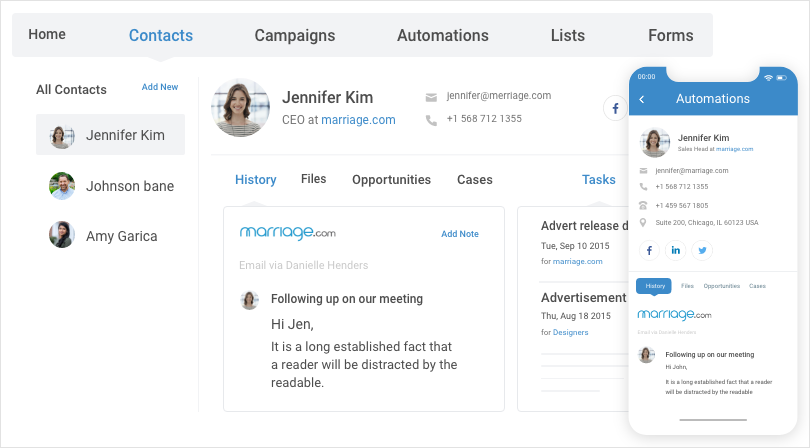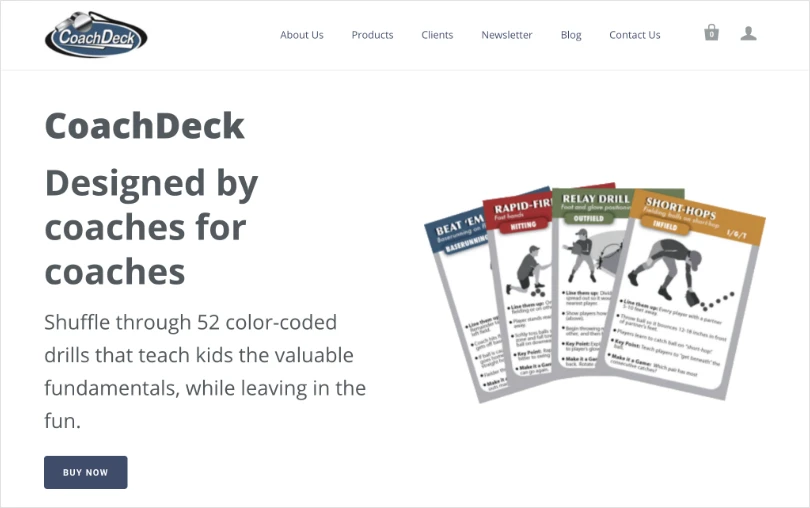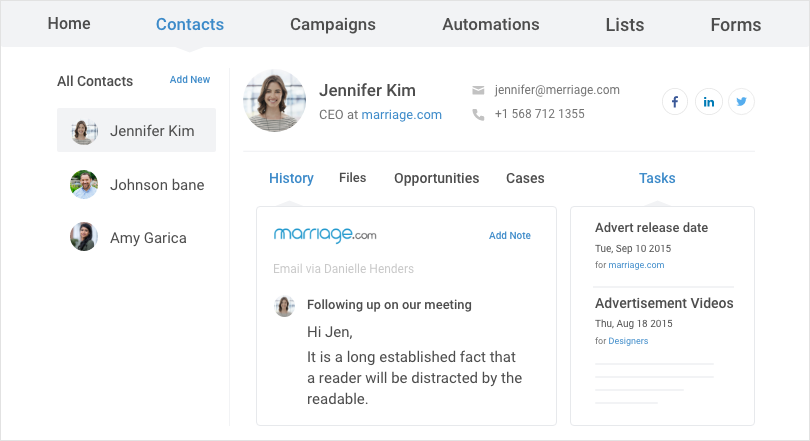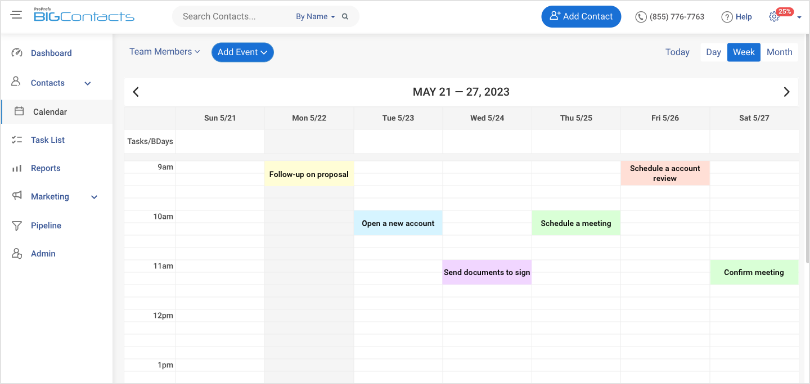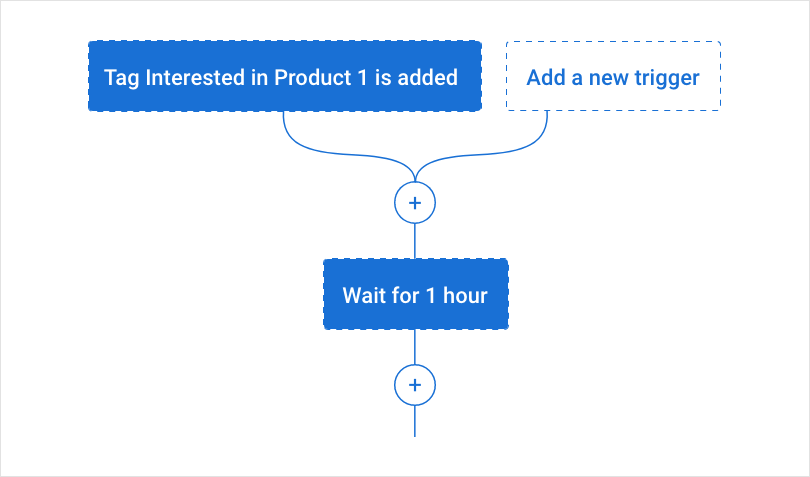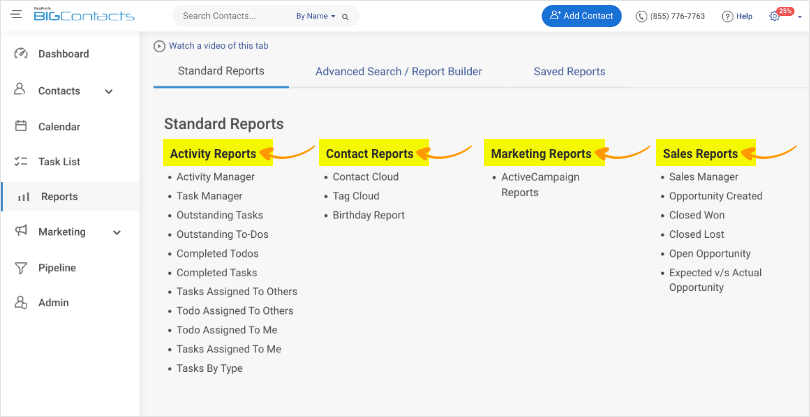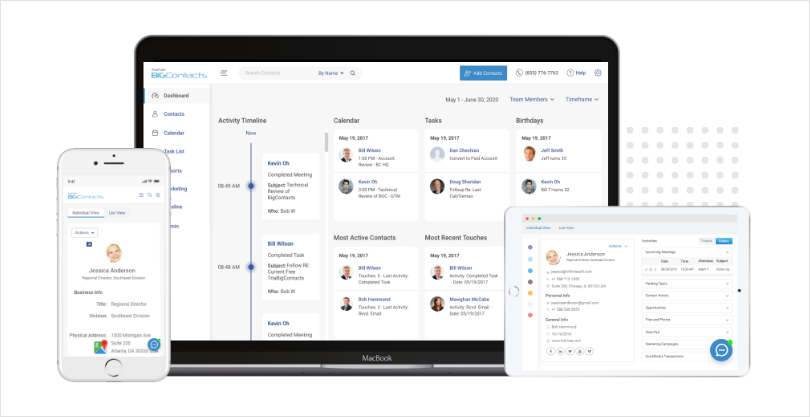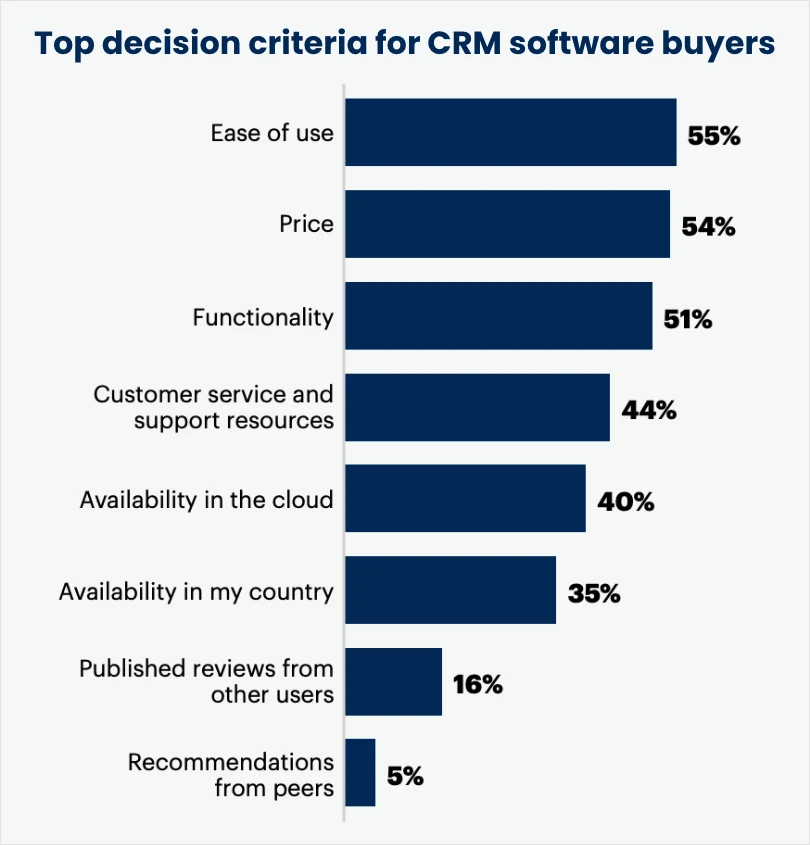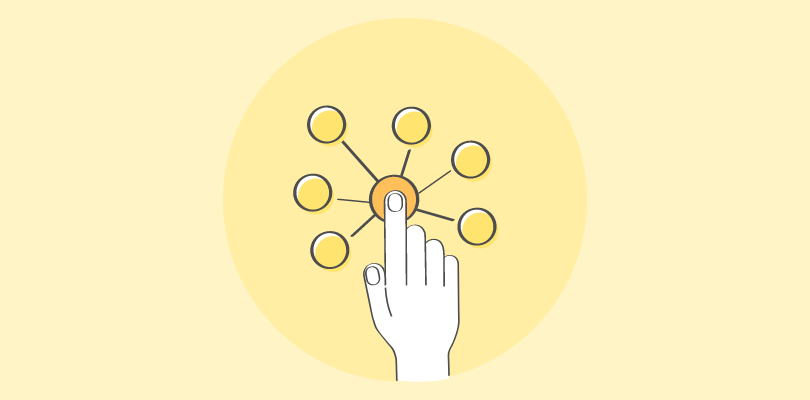Running a business today means staying connected — not just with your customers, but across your sales, marketing, and support efforts too. And as your business grows, so does the complexity of keeping everything aligned.
That’s where CRM steps in.
But first, what is CRM?
If you’ve ever asked yourself what is CRM, here’s the answer: it’s your central hub for customer data — a single source of truth that allows your team to work smarter and connect better.
A CRM (customer relationship management) system helps you:
- Track every lead, conversation, and deal in one place
- Personalize outreach based on customer behavior and history
- Automate repetitive tasks like follow-ups and emails
Whether you’re running a small team or scaling fast, CRM gives you the consistency and control needed to grow without dropping the ball on your customer relationships.
Let’s get started — and uncover how CRM can become your biggest competitive edge.
What Is CRM Software & How Does It Work?
CRM software is a tool that helps you store, track, and manage every interaction your business has with leads and customers — all in one place. It gives you a clear, organized view of your entire sales pipeline, customer history, emails, calls, meetings, and even team notes — without digging through spreadsheets or scattered inboxes.
Whether you’re nurturing new prospects or staying top-of-mind with long-time clients, your CRM becomes your go-to system for staying on track and closing deals faster.
Here’s How It Works (Without the Tech Overload):
- Capture Contacts Automatically
Leads from your website forms, email signups, or social ads flow directly into your CRM. No manual entry required. - Track Conversations Seamlessly
Every email, call, and meeting is logged under the contact’s profile — so you and your team always have context. - Move Deals Through a Pipeline
Visual sales stages help you move leads from “just browsing” to “signed and onboarded.” Follow-ups become effortless. - Automate the Repetitive Stuff
Want to send a welcome email or assign a task when a new lead comes in? CRM automation handles it for you. - Get Reports Without Chasing Numbers
See what’s working, who’s closing, and where your bottlenecks are — in real time, with easy dashboards.
What Are the Types of CRM Systems?
Now, let’s break down the three main types of CRM systems so you can figure out what fits your business best:
1. Operational CRM – For Managing Day-to-Day Sales, Marketing & Service
If your biggest need is keeping your sales, marketing, and support workflows aligned, this is your go-to.
You’ll love it if you want to:
- Automate lead capture and follow-ups
- Assign tasks to your team based on lead behavior
- Set up email drip campaigns and deal pipelines
- Make sure nothing slips through the cracks
Best for: SMBs, startups, and growing teams that want to systematize customer engagement.
2. Analytical CRM – For Insights, Forecasting & Smarter Decisions
This one’s for the data lovers (or the data-starved).
You’ll love it if you want to:
- Understand which campaigns are working
- Spot high-value customers
- Predict future sales trends
- Personalize outreach based on real behavior
Best for: Companies ready to use customer data to make strategic decisions.
3. Collaborative CRM – For Getting Your Whole Team on the Same Page
When your sales, support, and marketing teams feel like separate islands, a collaborative CRM brings them together.
You’ll love it if you want to:
- Share customer insights across departments
- Sync up conversations between reps and support
- Keep everyone in the loop without endless email chains
Best for: Teams that work cross-functionally or need to hand off customers seamlessly.
CRM vs ERP vs Help Desk Software: What’s the Difference?
If you’re exploring tools to run your business better, chances are you’ve come across CRM, ERP, and Help Desk software — and maybe even wondered, “Do I need all three?” or “Aren’t they kind of the same?”
Let’s clear that up.
These systems might sound similar (and sometimes overlap), but they solve very different problems. Here’s a breakdown to help you figure out what fits your current needs — and what might come later as you scale.
| Feature / Focus Area | CRM (Customer Relationship Management) | ERP (Enterprise Resource Planning) | Help Desk Software |
|---|---|---|---|
| Primary Purpose | Manage customer relationships, leads & sales | Manage business processes like finance, HR, inventory | Handle customer service tickets and support requests |
| Core Users | Sales, Marketing, Support teams | Finance, Operations, HR | Support/Customer Success teams |
| Helps You Do What? | Nurture leads, manage contacts, track deals, and follow up on time | Run internal processes efficiently | Resolve issues and respond to support tickets |
| Data Tracked | Contacts, deals, activities, interactions | Payroll, orders, supply chain, financials | Issues, tickets, resolutions, customer queries |
| Common Features | Sales pipeline, email automation, contact management | Invoicing, accounting, inventory, HR management | Ticketing system, knowledge base, live chat |
| When You Need It | When you want to grow your customer base and boost sales | When you need to manage complex internal operations | When you want to deliver better, faster customer support |
| Scalability | Ideal for startups to enterprises | Best for mid-size to large organizations | Scales well with customer base size |
Who Can Benefit From CRM?
Customer relationship management helps individuals and organizations manage their interactions with prospects and customers efficiently.
However, what is customer relationship management (CRM) really about? It’s much more than a contact or address book.
It is a powerful technology that collects complete information from different departments and centralizes this data to provide a 360-degree view of each customer in real-time.
Right from the implementation point, a CRM tool becomes the perfect companion to grow business with each customer. As the customer records are updated regularly in the software, it becomes easier for teams to assist customers at any point — from pre-sales engagement to after-sales support.
Irrespective of its scale or size, every enterprise needs to manage its customer relationships. Additionally, the improved organization that CRM provides can propel business growth.
Curious what else it can do? These CRM benefits can show you how it drives growth, productivity, and customer satisfaction.
The widespread popularity of CRM can be seen from the exponential growth of the industry, with its overall revenue estimated to reach 97.90 billion USD by 2025.
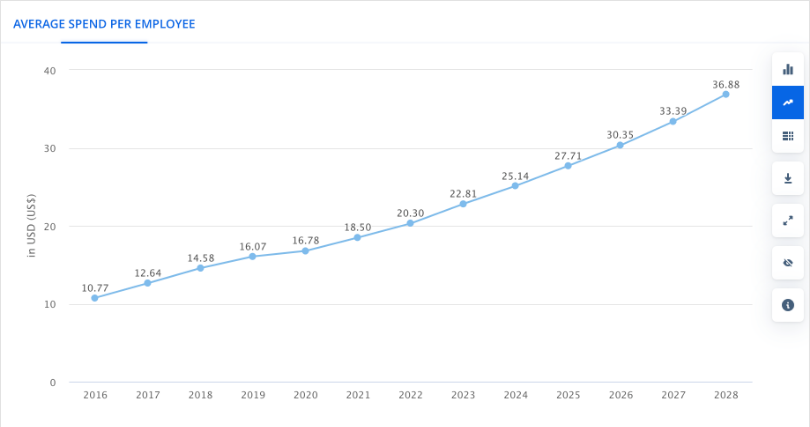
CRM systems have been adopted by businesses across the board to maximize profitability — whether it’s startups or well-established enterprises.
1. Small Businesses & Startups
CRM systems can prove to be especially effective for small businesses that have a limited number of people managing all the operations.
For small businesses, it is important to get the most out of every dollar and minute spent. By acting as a repository of customer information and a platform for managing all business processes, CRM software can help small business owners save time and resources that go into using multiple tools.
With the reporting & analytics module of CRM software, small businesses can monitor their progress and make the required amends to their business strategy.
The improved data access makes it easy to personalize customer experiences and tailor them to the specific needs of the target audience.
To ensure you pick the best-fit CRM from the start, check out this step-by-step CRM selection guide for small businesses.
2. Large Enterprises
Large enterprises, on the other hand, can obtain maximum benefit from a CRM system by boosting collaboration across the organization. By tracking and managing all activities, keeping data updated, and allowing the team to collaborate, a CRM system can be the all-in-one solution for driving growth.
When working with a large team and volumes of data, keeping things uniform and updated can become challenging. This is where a CRM system can prove to be of great value to large businesses. Every division of the organization, including sales, marketing, and customer service teams, can work together on a single platform.
Overcoming Business Challenges with CRM
A Gartner survey revealed that 80% of industry leaders use CRM.
This is a result of a broad scope of business objectives that a CRM system can help accomplish.
Without a CRM tool, you may find it challenging to:
- Manage customer data and interactions from a single platform
- Keep track of customer needs & preferences to deliver personalized solutions
- Enable internal communication & collaboration among various business departments
- Deliver timely updates & notifications to team members
- Track sales opportunities & move them forward in the sales funnel
An efficient CRM tool can overcome all these challenges, allowing you to boost your bottom line.
A CRM system can schedule, track and manage all calls, meetings, and events. This ensures that no important event is missed. Additionally, it updates the data in the team calendar so everyone has a clear idea of the upcoming events and meetings.
Since all the communications are logged in one place, it becomes easy to keep track of the customer’s expectations, preferences, and current positions. This helps personalize experiences, leading to reduces churn rate and long-lasting customer relationships.
Along with managing tasks and activities, CRM also helps automate repetitive tasks such as manual data entry and notifications, improving organizational efficiency and freeing up more time for acquiring new customers.
CRM in Action: Real Use Cases & Success Stories
Here are some examples of excellent CRM strategies at play that you can learn from to make more bang for your buck.
1. Amazon
Amazon, the e-commerce giant, effectively demonstrates how a powerful CRM strategy can result in a loyal customer base that keeps coming back.
Key Takeaways:
- Amazon captures the personal data of its customers and uses it to personalize services and on-site experiences. This also makes it possible to deliver relevant offers and promotions.
- The company reduces the need for customer support by enabling its customers to readily access all information related to their previous purchases and resolve queries in a jiffy.
- The recommendation engine uses the data stored in the CRM system and behavior tracking to show relevant products to the user.
2. CoachDeck
CoachDeck, a leading provider of drill cards for youth sports coaches, leverages a powerful CRM system- BIGContacts, to delight its users.
Key Takeaways:
- The CRM system helps the company access detailed contact activity timelines to track previous engagements.
- The company uses email templates to save time and automates its outreach campaigns to follow up with clients at the right time.
- Easy access to communication history and preferences allows CoachDeck to personalize its solutions to a great extent.
3. Anchor Resort
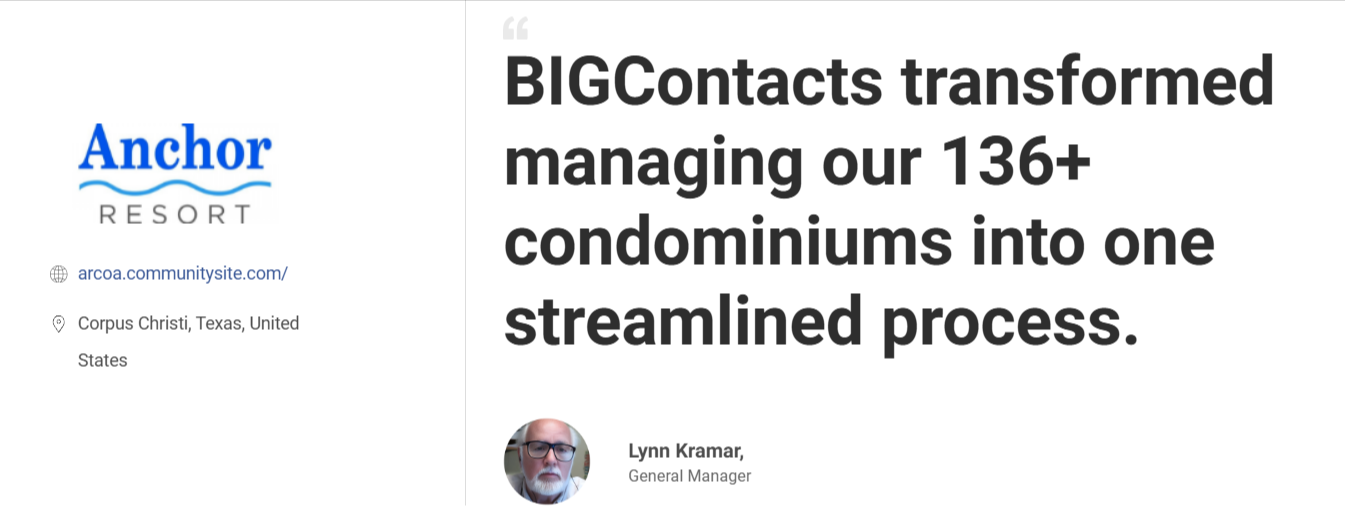
Anchor Resort & Condominiums, a luxurious haven on the Texas Gulf Coast, streamlined its property management by implementing BIGContacts CRM.
Key Takeaways:
- Centralized Data Management: Transitioned from disparate tools like spreadsheets and Word documents to a unified CRM system, enhancing efficiency.
- Unit-Centric Tracking: Configured the CRM to associate data with condo units rather than individual owners, simplifying historical data access.
- Improved Productivity: Enabled quick retrieval of property-related information, regardless of ownership changes, boosting team productivity.
The Advantages of CRM: How it Simplifies Sales, Marketing & Support
Customer support, marketing, and sales support function better with a CRM system in place. Discover how these teams can leverage CRM software to craft more unified and satisfactory customer experiences.
1. Sales: Close More Deals, Without the Chaos
CRM works as a centralized database for leads and their associated information. It can also be used to create, maintain, and enrich contact profiles, aiding personalized communication. The sales team can use the system to score and prioritize leads based on intent and previous engagement.
CRM logs all interactions associated with a contact record in one place, allowing any team member to access them. This eliminates any communication gap even if the responsible sales executive is not available.
You can also streamline and automate various sales functions, such as capturing lead data or sending email follow-ups based on specified rules. Additionally, the sales pipeline management capabilities of a CRM tool can help you visualize the movement of leads through your sales cycle. Detailed sales reports can be generated to identify areas of improvement in the sales process.
2. Marketing: Reach the Right People, at the Right Time
CRM software helps your marketing team work smarter — not harder.
- Automate emails, promotions, and nurture sequences based on behavior (like clicks, purchases, or form submissions).
- Segment your audience into targeted lists so they only get content that actually matters to them.
- Track which campaigns and channels are driving the best leads — and double down on them.
- Run personalized, multi-channel campaigns without manually handling every step.
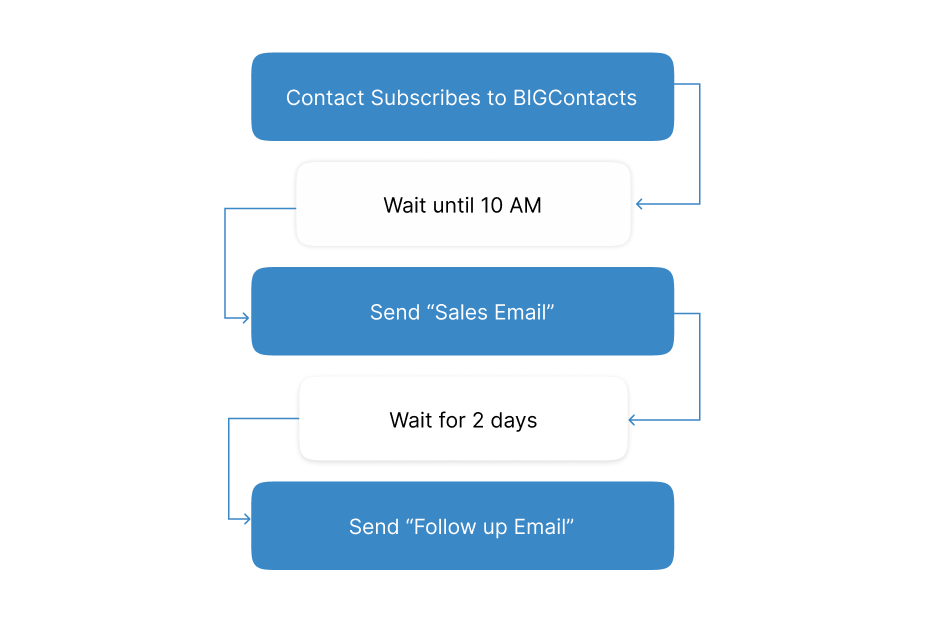
Want to know what CRM management is really about in the marketing world? It’s about connecting with your audience in a way that feels 1:1 — even when you’re reaching thousands.
From abandoned carts to event invites, CRM ensures your brand stays top-of-mind without overloading your team.
3. Support: Serve Faster, Solve Smarter
Great customer support isn’t just a nice-to-have — it’s a growth lever. And with CRM, your support team is ready before the customer even finishes explaining the problem.
- Access a full interaction history with every customer — no repeats, no confusion.
- Use built-in help desk tools to manage, assign, and resolve tickets.
- Tag priority issues and route them to the right team instantly.
- Send follow-up emails that feel personal and helpful — not robotic.
Your agents can see past purchases, open tickets, or preferences in seconds. That makes it easier to resolve issues, offer relevant upsells, or even anticipate needs before they arise.
The Key Features & Capabilities of CRM
Understanding what CRM is and how to use it effectively can enable you to keep customers engaged and loyal. Some of the key capabilities of a CRM tool are discussed below.
1. Contact Management
CRM can work as a software to manage contacts to improve your outreach efforts, offering insights and details about your existing and potential customers. From the name, email address, mobile number, birthdays, and designations, to social media accounts, previous contact history, and other activities, your team can view the complete profile of the customer from a single place.
2. Task Management
CRM helps manage all tasks and activities to improve organizational efficiency. Tasks can be assigned based on their priority status and the resources available. Individual and team calendar views help keep track of upcoming meetings or activities and identify which team members are associated with which tasks.
3. Workflow Automation
CRM helps streamline workflow and automate tedious tasks. This can establish a standardized process and ensure equitable distribution of tasks. Additionally, automation eliminates human errors or delays and frees up time for more critical tasks. It also boosts collaboration within the organization by aiding information sharing and bringing every division to one platform.
4. Email Marketing
Use a CRM tool to craft automated drip email campaigns. These emails can be tailored to suit the specific needs of the audience group you are targeting. CRM with integrated email marketing capabilities makes lead nurturing and customer retention significantly easier. You can set custom triggers for these automated campaigns, ensuring the right emails at the right time.
Looking to Automate Your Email Marketing Efforts?
5. Pipeline Tracking
CRM enables pipeline management, helping you attain better visibility into available sales opportunities. Use a CRM application to create a custom sales pipeline that makes it easy to visualize and track the movement of leads. This also enhances the overall effectiveness of the sales team since all the required information is instantly accessible from a single place.
6. Instant Alerts
CRM keeps everyone updated with alerts and notifications to ensure that important opportunities are never missed. Updates can be shared with all team members, and the progress of activities can be tracked with a CRM system in place. This contributes to enhanced internal communication and allows your business to deliver exceptional customer experiences.
7. Reporting & Analytics
With powerful analytics and custom reporting, you can track any relevant metric. CRM allows you to generate reports that analyze the performance of campaigns, business operations, and team members. These insightful reports can provide an overview of the business activities and help you make better decisions.
8. Integrations
CRM can be connected with other business tools such as chat/call support software, contact books, analytics tools, etc. This can keep data updated across multiple platforms, allowing you to avoid any discrepancies and customer frustration.
9. Mobile Access
Mobile access is an essential feature of CRM systems that helps you stay updated with relevant information on the go. It will enable you to log changes instantly and manage upcoming tasks from anywhere. Mobile CRM also improves data sharing and team collaboration.
CRM & the Future: Trends to Watch (AI, Automation & Beyond)
As customer expectations evolve and technology advances, CRM software is transforming into a dynamic, AI-driven platform that not only tracks interactions but actually helps you predict, automate, and personalize every touchpoint.
If you’re serious about scaling, these are the emerging CRM trends worth watching — and adopting.
1. AI-Powered Predictive Personalization at Scale
CRM tools are moving from reactive to proactive engagement, using advanced AI to not just track behavior, but predict intent with razor-sharp accuracy. Expect CRM platforms to:
- Suggest next-best actions in real-time
- Auto-generate hyper-personalized content (emails, offers, follow-ups)
- Adapt messaging dynamically based on sentiment, channel usage, or inactivity patterns
2. Voice-Activated CRM and Conversational Interfaces
With the rise of tools like ChatGPT and Alexa, CRM systems are starting to support voice commands and conversational updates.
- Sales reps will soon log calls or update deals simply by speaking to the CRM.
- Voice insights and summaries will reduce admin time and improve mobile usability.
3. Emotion AI and Sentiment Tracking
Next-gen CRMs will go beyond “what was said” and start understanding “how it was said.”
- Built-in emotion detection (from emails, calls, or chat logs) will help teams gauge customer tone and urgency.
- This will trigger smart actions like priority routing, empathetic messaging, or churn alerts.
4. CRM as a Revenue Operating System
The future CRM will become a revenue intelligence hub, integrating data from sales, marketing, CS, finance, and ops — not just a customer database.
- It will forecast revenue trends, identify pipeline risk, and allocate resources dynamically.
- Think: CRM + Revenue Operations (RevOps) + Business Intelligence (BI) tool in one.
5. AR/VR Integration for Immersive Sales & Support
As AR/VR becomes more accessible, visual product demos, virtual onboarding, and remote support will be delivered directly through CRM platforms.
- Especially relevant for real estate, manufacturing, and high-touch sales cycles.
- Imagine conducting a 3D product tour or onboarding session — tracked, scored, and stored by your CRM.
6. Decentralized CRM (Web3-Driven Models)
In Web3 contexts, expect decentralized data ownership where customers can grant, revoke, or monetize access to their data via tokens or blockchain credentials.
- CRMs will need to be more transparent, portable, and compliant with evolving data regulations and user-controlled ecosystems.
7. CRM + IoT for Real-Time Customer Insights
With IoT (Internet of Things) integrations, CRMs will pull live data from connected devices to personalize service or trigger actions.
- Example: A smart appliance signals a maintenance issue → CRM auto-creates a ticket + sends customer update + books service.
8. Sustainability-Centric CRM Workflows
As ESG (Environmental, Social, Governance) priorities grow, CRMs will begin to track sustainability-focused customer data:
- Customer preferences for eco-friendly packaging or delivery
- Carbon offset options in purchase workflows
- Green loyalty program engagement
How to Choose the Right CRM Software
According to Gartner, ease of use (55%), pricing (54%), and functionality (51%) are the top three criteria influencing the CRM purchase decision for software buyers.
Following are some steps to help you choose the right CRM solution for your business.
1. Know What You Need
Every business has different goals and, consequently, different expectations from CRM. To find the best tool, begin by analyzing your pain points and defining business objectives.
What is the most crucial objective of your CRM implementation? Are you looking to improve productivity, enhance experiences, track leads, or automate processes?
Take your needs into account and then assess different tools against these requirements to find the most effective software.
2. Get Your Team Onboard
The adoption of CRM is a major change that may be uncomfortable for some team members. For a smooth transition from your conventional methods, you need to get everyone involved.
Having an effective implementation strategy is essential, as you might not have a technical team to get the software underway. The learning curve should be easy as most of your team members who are going to use the software will be from a support/sales background. It is always better to choose a CRM tool that involves easy installation and adapts to your existing processes readily.
3. Get a CRM With Remote Access
Mobile access is one of the most critical features that you should consider in a CRM tool. In today’s fast-paced and competitive world, you need to have data at your fingertips to connect with your customers at the right time. A CRM with remote access can keep contact data synchronized and help your team access it immediately from any mobile device.
4. Check Compatibility With Your Current System
The tool that you pick should offer easy migration to help you move your existing data with ease. Moreover, you should look into the type of integrations that the CRM software offers. This can help you ensure that the tool is compatible with other tools like marketing automation, helpdesk, account management systems, etc., that you currently use.
5. Consider Reporting Capabilities
The CRM system should enable you to generate insightful reports to make better decisions. Custom reports tracking various metrics can help you track the performance of your sales and marketing efforts and identify key areas for improvement. Efficient reporting and analytics will provide you with enhanced visibility into your processes and help you make more accurate sales and revenue forecasts.
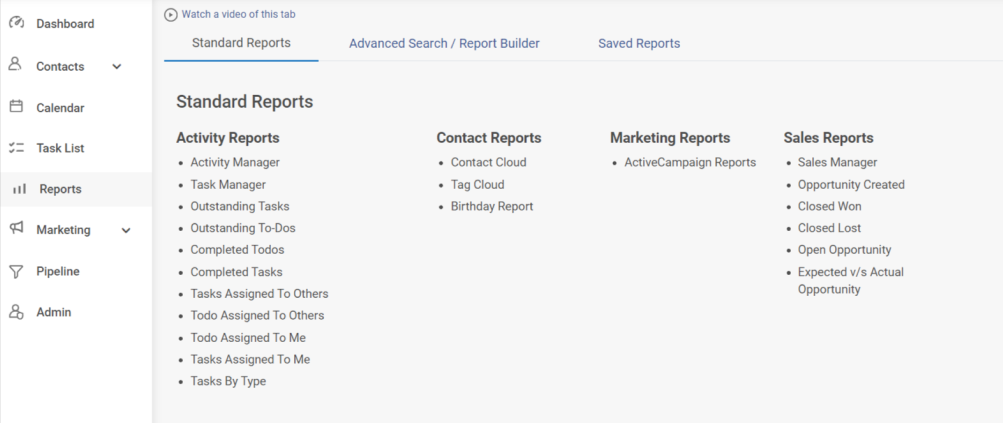
6. Look for Marketing Integration
A CRM system with email integration and marketing automation capabilities can help you reach out to prospects more effectively. You can create and manage drip email campaigns to make your outreach more targeted and relevant to your customers. Go for a tool that offers custom templates, bulk emails, and email tracking functionalities.
7. Find a Tool Within Your Budget
Find a CRM that fits within your budget while providing a good return on investment. You can easily find several affordable tools that meet your budgetary requirements.
Consider the pricing plans offered by multiple CRM vendors to find one that is ideal for your business. Also, keep in mind the total cost of ownership, including any hidden costs, such as additional fees for add-ons, upgrades, or technical support.
8. Go for a Security Compliant Tool
The EU General Data Protection Regulation (GDPR) makes it important to have a CRM tool with inbuilt GDPR compliance. So, all the data collected by the CRM software won’t be a violation of any privacy law. You can ask for customers’ consent to store their personal details in your system.
Doing this manually will consume a lot of time and can be sloppy. But with the help of CRM software, you can quickly set up and communicate with your customers by following GDPR guidelines. It helps in building trust as you handle the customer’s data with respect.
Start Your CRM Journey & Set Your Business Up for Growth
CRM can facilitate business growth and drive better profits for your business. However, to access such benefits, you need to find a suitable tool with advanced features. You also require a detailed implementation plan that gets everyone on board with the system.
Find the most optimal tool based on your requirements, import data, and train your staff effectively. It is also important to routinely monitor the progress of implementation, seek feedback from your team, and address challenges promptly.
Leading software vendors like BIGContacts come with a free trial. The best way to get started with CRM is to make use of this free trial to find out if the tool fits your specific needs. Test out all the features and functionalities to invest in the most optimal solution.
Moreover, reliable customer support and powerful documentation can further simplify the customer relationship management process. Investing in a powerful CRM offering such capabilities will add immense value to your business by keeping your data secure and accessible.
Frequently Asked Questions
How do I choose the right CRM software for my business?
In order to choose the most effective CRM for your business, consider your specific needs and goals, such as sales management, marketing automation, or customer service. Evaluate the features, pricing, and ease of use of different CRM options, and make sure to read online reviews and get recommendations from other businesses in your industry.
What is the cost of implementing CRM software?
CRM pricing is highly variable and depends on numerous factors, such as the size of your business, the features and level of customization you require, and the vendor you choose. Some CRM systems have a monthly or annual subscription fee, while others charge a one-time licensing fee. Additional costs may include customization, training, and support services.
How can I train my employees on how to use CRM software?
To train employees on how to use CRM (Customer Relationship Management) software, provide them with detailed documentation and resources, conduct hands-on training sessions, and offer ongoing support and feedback. It's also helpful to incentivize and encourage employees to use the CRM regularly.
In addition to initial training, it's crucial to offer regular retraining sessions to ensure that employees are up-to-date. This can be particularly helpful when introducing new hires or when implementing major updates to the CRM system. Retraining can help maintain a high level of proficiency and engagement among employees.
When is the best time to implement CRM?
Some indicators that your business may be in need of CRM software are:
- Your customer data is scattered across multiple platforms, making it difficult to access it at the right time
- Your employees find it difficult to work together and share information
- Important details get lost, leading to inefficiencies in your operations
- There’s no way for you to track the effectiveness of your activities
FREE. All Features. FOREVER!
Try our Forever FREE account with all premium features!

